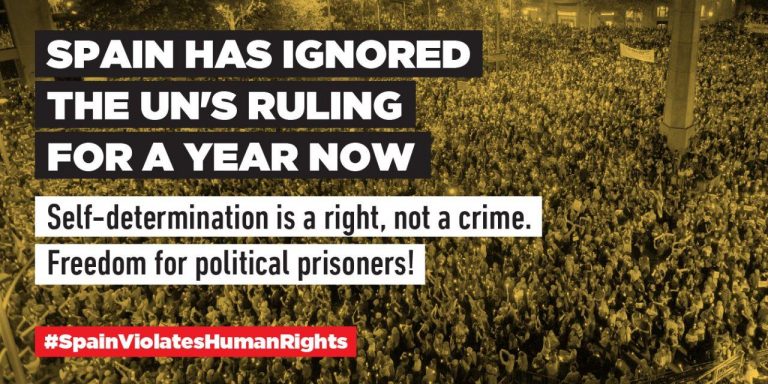
The rulings were the result of an initiative by the defences of the Catalan political prisoners, led by British & French lawyers and human rights experts Ben Emmerson and Rachel Lindon.
Spain has ignored the opinion of the United Nations Working Group on Arbitrary Detention, published a year ago today, which called for the immediate release of Catalan political prisoners. The Working Group on Arbitrary Detention is a United Nations Human Rights Council body made up of independent human rights experts who investigate cases of imprisonment in violation of international treaties.
The UN experts stated that “supporting the self-determination of Catalonia does not constitute a crime,” and that “the organization of a referendum on self-determination is permitted under Spanish law.” They also stressed the “lack of a necessary element of violent confrontation in the accusations of rebellion and sedition”, which according to the experts was non-existent, and called the accusations “disproportionate and therefore incompatible with Spain’s obligations in the framework of international human rights norms”.
Several aspects led the Working Group to conclude that the arrests were made against “the principle of human equality because it was motivated by the leaders’ political opinion”, and that they were intended “to repress members of political groups to silence their claim in favour of self-determination.” Amongst these factors were the rejection by the Schleswig-Holstein Supreme Court of Justice to extradite Catalan President Carles Puigdemont for the above-mentioned lack of violence and the ensuing Spanish withdrawal of the European Arrest Warrants against other Catalan leaders in exile; the violation of the presumption of innocence by members of the Spanish government and the unionist parties; and the arrests “directly related to social mobilizations”.
Moreover, the violation of territorial jurisdiction, by which according to the experts, the accused should have been judged by a court in Catalonia, along with the statements of the Deputy Prime Minister of the Spanish Government that they had “beheaded the leadership of the independence movement,” were indications of a lack of judicial independence and that it was impossible to be availed of a trial by a “competent and impartial” court. This lack of impartiality was confirmed by the extreme opacity and hindrance to the presence of international observers during the trial against the Catalan leaders, and the severity of the sentences.
For these reasons, the Working Group on Arbitrary Detention called for the “immediate release” of the prisoners and for an “exhaustive and independent” investigation into the circumstances that led to their pre-trial detention, in addition to calling on the Spanish government to notify them of any progress made, none of which has ever been done.
New rights violations inflicted by Spain
During the Covid19 crisis, Spain has once again violated the rights of the Catalan political prisoners. Following the recommendations of international bodies such as the UN, WHO, the Council of Europe, and NGOs such as Amnesty International or Human Rights Watch, countries around the world have released thousands of prisoners, including those who have been arbitrarily detained. Instead of observing the example of European neighbours such as the Netherlands, France and Germany, Spain has chosen to keep the Catalan political prisoners in jail.
A joint and coordinated initiative
The complaint submitted to the Arbitrary Detention Working Group was the result of an initiative by the defences of the Catalan political prisoners in February of 2018, promoted by the Catalan National Assembly and Òmnium Cultural, led by the British and French lawyers and human rights experts Ben Emmerson and Rachel Lindon.
After a year, and in the face of Spain’s refusal to respect the rulings of the UN, both organizations denounce the Spanish government’s lack of respect for and compliance with international treaties, which Spain has signed and ratified, and wish to recall that the legal persecution of political opinions and freedom of expression aims to reduce popular participation in politics, which is a direct attack on democracy.
In addition, both organizations claim that imprisonment criminalizes political dissent, and the exercise of the right to self-determination, freedom of expression and freedom of peaceful assembly, all of which are recognized in the international treaties, which reinforces the political character of these incarcerations.
Indeed, the Spanish Constitutional Court has convened a plenary session on June 16 to deal with the request by the Catalan political prisoners for cautionary measures to suspend the sentences, and where the Spanish authorities will have a new opportunity to comply with the opinion of the Working Group of Arbitrary Detention and release of Catalan political prisoners.
In this regard, the Catalan National Assembly and Catalan Omnium Cultural join the Working Group and call on Spain to face the political nature of these imprisonments, and consequently release the political prisoners and respect the exercise by the Catalan people of fundamental rights such as freedom of expression, peaceful assembly and the right to self-determination.